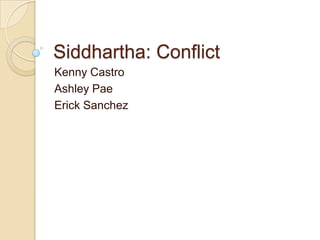
Siddhartha Conflict
- 1. Siddhartha: Conflict Kenny Castro Ashley Pae Erick Sanchez
- 2. Conflict Internal- a conflict between forces or emotions within one character External- a struggle against some outside force, another character, society, as a whole, or some natural force.
- 3. Beginning-Internal Conflict “Siddhartha had begun to feel the seeds of discontent within him. He had begun to feel that the love of his father and mother, and also the love of his friend Govinda, would not always make him happy, give him peace, satisfy and suffice him.” (pg 5) This is an internal conflict, because Siddhartha doesn’t feel happiness with his life. He wants to do something else.
- 4. Beginning- External Conflict Gotama(Buddha)-“He has robbed me of my friend, who believed in me and who now believes in him; he was my s hadow and is now Gotama’s shadow. ( pg 36) Govinda leaves Siddhartha to follow G otama. This is a conflict because the one pers on that believed in Siddhartha left him as well.
- 5. Middle- Internal Conflict “...but above all he was nauseated with himself, with his perfumed hair, with the smell from his mouth, with the soft flabby appearance of his skin...the restless man wish he could rid himself of these habits of this entirely senseless life.” Siddhartha's internal conflict is that he cannot find internal peace and is not contempt with his possessions. Sidharthabelieves he has strayed away from the path of enlightenment, and begins to dipise himself.
- 6. Middle- External Conflict “Siddhartha became impatient at losses, he lost patience with slow paying debtors, he was no longer kind hearted to beggars, he no longer had the desire to give gifts and loans to the poor.” Siddhartha's external conflict was his money, and the society he has joined. Siddhartha’s money hanged him and made him materialistic. he began to obsses over money and how much he had.
- 7. Ending- Internal Conflict "So many, so many thousands possess this sweetest of good fortunes--why don't I? Even bad people, even thieves and robbers have children and love them, and are being loved by them, all except for me.“ (Ch. Om) Siddhartha resents and feels jealous of seeing people with children. He did everything possible in order for him to be with his son, but his son left.
- 8. Ending- External Conflict Govinda sees that Siddhartha has reached enlightenment, while he has not. He followed Gotama and learned but never reached enlightenment. "I'm not kidding. I'm telling you what I've found. Knowledge can be conveyed, but not wisdom. It can be found, it can be lived, it is possible to be carried by it, miracles can be performed with it, but it cannot be expressed in words and taught.” (Ch. Govinda)